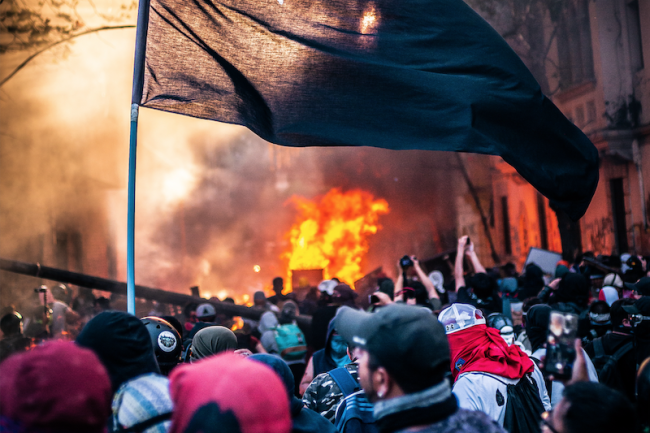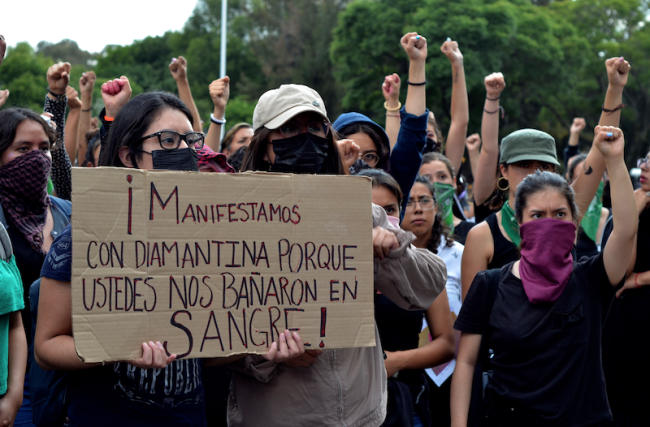
This piece appeared in the Spring 2023 issue of NACLA's quarterly print magazine, the NACLA Report. Subscribe in print today!
In October 2019, street protests and violent clashes rocked Chile. As the police and military temporarily lost control of the historic uprising against inequality and neoliberalism, the governing and opposition parties agreed to hold a plebiscite on whether to rewrite the country’s dictatorship-era constitution. A constituent assembly convened in 2021 drafted a new constitution, but in a plebiscite on September 4, 2022, voters rejected the proposal. The result came as a blow to the six-month-old government of leftist President Gabriel Boric, who as a member of Congress had helped to negotiate the agreement that opened the door to the constitutional process.
A week after the draft constitution’s defeat, anarchists took to the streets to mark the 49th anniversary of General Augusto Pinochet’s 1973 military coup. Although Boric had openly expressed support in 2019 for the mass student-led fare evasions that sparked the uprising, effectively backing a broad coalition with anarchists, on the coup’s anniversary, Boric’s riot police attacked the anarchists with tear gas and water cannons. Few anarchists were surprised. This is how governments—whether dictatorial or democratic, rightist or leftist—historically have dealt with the most radical wing of the Left.
Left-wing politics have awakened again in Latin America after a regional rightward turn that marked the decline of the early 21st century Pink Tide. In eight Latin American countries, leftist leaders have captured one presidential victory after another since 2018. The “Left,” however, is not monolithic. Nor is the entire Left enamored with controlling state power. In response to Latin America’s new left turn, anarchists have resurrected their historical critiques of both free market and state-centered solutions. Despite their anticapitalist rhetoric, leaders of the first Pink Tide continued promoting extractive capitalism with only limited redistributive change. This has led anarchists to predict that today’s cohort of leftist governments will do little better.
These critiques carry forward a tradition of anarchist challenges to capitalism and the state dating to the late 1800s. As the oldest wing of Latin American leftist politics, anarchists dominated the Left for decades before the first parliamentarian socialists and then Marxist political parties arrived on the scene. Today, with an emphasis on decentralized power and the importance of organizing the working and dominated classes for direct democracy and direct action, Latin American anarchism, too, is awakening. Challenging neoliberal capitalism and the left-leaning governments now in office, anarchist organizations and anarchic forms of decentralized popular activism offer important alternatives to the limits of the market and state.
Anarchy is not chaos. Rather, anarchists seek political order through local and municipal level direct action that allows people to live, work, create, and socialize on egalitarian terms, with no rulers or managers. In this vision, the liberation of working and dominated classes must not rely on the state or political parties—even working-class political parties—nor engage in the quest for vertical power through electoral politics. Instead, anarchists seek to inspire average people to build power outside of governmental institutions, usually through social movements and direct action, direct democracy, and horizontal cooperation with other dominated classes. This is “social power” or “popular power.”
A constant anarchist fear is that left political parties wish to capture grassroots social movements and coopt their energy for their own party’s political gain—and then maybe they will work to benefit the dominated classes after winning power. So, while anarchists might cooperate with mainstream leftist parties for shared goals and occasionally vote for leftist candidates—especially to replace right-wing or far-right presidents, as in Brazil and Chile—anarchist politics demand constant vigilance of political parties, media, NGOs, and other institutions. For anarchists, vertical political power is incapable of solving the plethora of economic, ethnic, racial, social, gender, and environmental problems facing the hemisphere. In this view, governments—even progressive ones— do little to respond to Indigenous demands, prevent violence against women, rein in extractive capitalism, fight imperialism, or battle authoritarian forces.
Anarchists and the Second Pink Tide
Mexico
The election of Mexico's Andres Manuel Lopez Obrador in 2018 kicked off a new era for the Latin American Left. It also marked the first leftist president elected in Mexico since Lazaro Cardenas in the 1930s. However, for many on the far left, several of AMLO's policies, such as cooperating with U.S. President Donald Trump on immigration, seemed anti-humanitarian and dangerous.
Anarchists joined other critics to condemn the government's planned megaprojects, especially the $20 billion Mayan Train across the Yucatan Peninsula. While the state has promoted the train as key to southern Mexico's economic development, anarchists joined environmental and Indigenous organizations to argue the project will negatively impact peoples and environments while doing little to improve the lives of poor Mexicans. It is just another lavish state project with little if any say or input from the people it is supposedly aimed to help.

Anarchists also attack the frequent lawlessness of the Mexican military-long at war with the drug cartels, but also susceptible to cartel influence-and the Mexican police departments that do little to investigate murders and disappearances, especially of women. At the same time, anarchist support for and work with the Zapatista movement has kept pace with that movement's growth. In 2019, the Zapatistas organized 11 new resistance centers and 16 new autonomous municipalities, bringing the total of organized territories to 43.
Anarchists have been particularly active in Mexico's growing feminist movement, which expanded in recent years largely in response to police and government inaction in the face of rampant femicides, transfemicides, and sexual assault, including at the hands of authorities. Anarcha-feminists are important and visible in protests such as the annual March 8 International Women's Day demonstrations. The actions reflect anarchist concepts of popular power and the need to find solutions beyond what they see as AMLO's ineffective, top-down policies.
While many feminists demand that the government actively prosecute perpetrators of rape and gender-based violence, anarchists focus their efforts on decentralized mobilizations of women and men as tools of collective empowerment to expose abusers and generate grassroots organizations.
Brazil
Brazil's October 2022 presidential elections were one instance where some anarchists cautiously supported electoral politics. Faced with another four years under far-right President Jair Bolsonaro, many anarchists advocated voting for leftist former president Luiz Im1cio Lula da Silva to stop a further slide toward fascism and the unrelenting destruction waged against the environment and Indigenous communities. Yet many Brazilian anarchists cautioned that even with a Lula victory, centralized state authority would not solve Brazil's structural problems, such as rampant sexual harassment, poverty, and environmental destruction.
Meanwhile, many anarchists rejected any foray into politics. As union activists and researchers Rafael Viana da Silva, Kauan Willian dos Santos, and Victor Khaled put it: "It makes no sense to harass anarchists to vote:' Instead, they argued, activists needed to "maintain [their] internal coherence:' Anarchists sought to accumulate social power by penetrating spaces where the working class labored, prayed, played, and lived, not excluding Bolsonaro strongholds like gun clubs, Pentecostal churches, and among truckers. However, it's questionable how much impact they made. Anarchists also pledged to continue working among trade unions and popular organizations since they feared that after a Lula victory, the Workers' Party-controlled state would use its comites populares de luta-peoples' committees mobilized across the country to support Lula's campaign-to coopt unions and popular movements.
Brazilian anarchist scholar Bruno Lima Rocha noted in the lead-up to the presidential runoff that even with Lula as president, major institutions would remain under right-wing and pro-corporate control. For instance, within the country's highly concentrated media landscape, the second-largest conglomerate is owned by the family of a right-wing evangelical bishop who openly endorsed Bolsonaro. This creates power to suppress debate about gender rights, abortion, and LGBTQI+ issues, which became far-right flashpoints under Bolsonaro. Lima Rocha stressed the importance of grassroots "struggle on a societal scale" around these concerns, as national media will not address them.
As some anarchists put it, it was okay to vote, but that was not enough. Regardless of the election outcome, the votes that counted were within unions, community and student associations, and popular movements building grassroots popular power.
Colombia
One of the potentially most radical leftist governments currently in office is that of former guerrilla fighter Gustavo Petro and Afro-Colombian activist Francia Marquez. Though the Petro-Marquez ticket campaigned on numerous left-of-center reforms, they still must navigate the capitalist world system and Colombia's traditionally oligarchic institutions. Anarchists have few illusions that the administration will deliver on reforms to effectively tax the rich, level the gaping class divides, or institute land reform.
Land reform offers a case in point. After the new government entered office, Indigenous, Afrodescendant, and other rural peoples ramped up occupations of private farms, urging the administration to follow through on its promises to address unequal land ownership. But Vice President Marquez called the occupiers "invaders:' Although the government reached an agreement to purchase land from cattle ranchers for redistribution to landless and land-poor families, the administration remains firmly committed to guaranteeing private property interests. This leads anarchists to see the Petro-Marquez government as a social democratic, liberal force that will not challenge deeply rooted traditional elites and capitalist structures.
Chile
Leftist former student leader Gabriel Boric assumed the presidency in early 2022 on the heels of the massive 2019 uprising against Chilean neoliberalism. During the unrest, anarchists formed "clans" as part of the frontline protest group known as the Primera Linea to physically confront riot police, point lasers at cops and surveillance drones, and shield protesters from police violence.
Read the rest of this article, available open access for a limited time.
Kirwin Shaffer is professor of Latin American Studies at Pennsylvania State University-Berks College. He is author of Anarchist Cuba (2019), Black Flag Boricuas (2013), and Anarchists of the Caribbean (2020).

